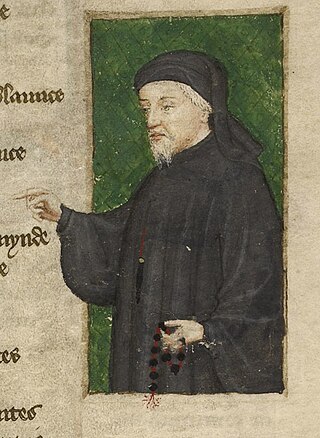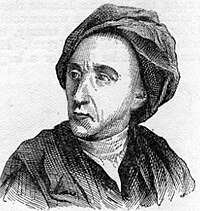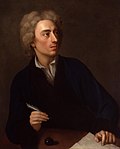
Geoffrey Chaucer was an English poet, author, and civil servant best known for The Canterbury Tales. He has been called the "father of English literature", or, alternatively, the "father of English poetry". He was the first writer to be buried in what has since come to be called Poets' Corner, in Westminster Abbey. Chaucer also gained fame as a philosopher and astronomer, composing the scientific A Treatise on the Astrolabe for his 10-year-old son Lewis. He maintained a career in the civil service as a bureaucrat, courtier, diplomat, and member of parliament.

Jonathan Swift was an Anglo-Irish satirist, author, essayist, political pamphleteer, poet, and Anglican cleric who became Dean of St Patrick's Cathedral, Dublin, hence his common sobriquet, "Dean Swift".

Alexander Pope was an English poet, translator, and satirist of the Enlightenment era who is considered one of the most prominent English poets of the early 18th century. An exponent of Augustan literature, Pope is best known for his satirical and discursive poetry including The Rape of the Lock, The Dunciad, and An Essay on Criticism, and for his translations of Homer.

Thomas Warton was an English literary historian, critic, and poet. He was appointed Poet Laureate in 1785, following the death of William Whitehead.

John Taylor was an English poet who dubbed himself "The Water Poet".

Michael Bruce was a Scottish poet and hymnist.

Nicholas Rowe was an English dramatist, poet and miscellaneous writer who was appointed Poet Laureate in 1715. His plays and poems were well-received during his lifetime, with one of his translations described as one of the greatest productions in English poetry. He was also considered the first editor of the works of William Shakespeare.

Lives of the Most Eminent English Poets (1779–81), alternatively known by the shorter title Lives of the Poets, is a work by Samuel Johnson comprising short biographies and critical appraisals of 52 poets, most of whom lived during the eighteenth century. These were arranged, approximately, by date of death.

The House of Fame is a Middle English poem by Geoffrey Chaucer, probably written between 1374 and 1385, making it one of his earlier works. It was most likely written after The Book of the Duchess, but its chronological relation to Chaucer's other early poems is uncertain.
Fables, Ancient and Modern is a collection of translations of classical and medieval poetry by John Dryden interspersed with some of his own works. Published in March 1700, it was his last and one of his greatest works. Dryden died two months later.

John Skelton, also known as John Shelton, possibly born in Diss, Norfolk, was an English poet and tutor to King Henry VIII of England. Skelton died in Westminster and was buried in St. Margaret's Church, although no trace of the tomb remains.
Nationality words link to articles with information on the nation's poetry or literature.
Nationality words link to articles with information on the nation's poetry or literature.
Nationality words link to articles with information on the nation's poetry or literature.

Gondibert is an epic poem by William Davenant. In it he attempts to combine the five-act structure of English Renaissance drama with the Homeric and Virgilian epic literary tradition. Davenant also sought to incorporate modern philosophical theories about government and passion, based primarily in the work of Thomas Hobbes, to whom Davenant sent drafts of the poem for review.
Chaucer's influence on 15th-century Scottish literature began towards the beginning of the century with King James I of Scotland. This first phase of Scottish "Chaucerianism" was followed by a second phase, comprising the works of Robert Henryson, William Dunbar, and Gavin Douglas. At this point, England has recognised Scotland as an independent state following the end of the Wars of Scottish Independence in 1357. Because of Scottish history and the English’s recent involvement in that history, all of these writers are familiar with the works of Geoffrey Chaucer.
The Eneados is a translation into Middle Scots of Virgil's Latin Aeneid, completed by the poet and clergyman Gavin Douglas in 1513.
Messiah is a 'sacred eclogue' by Alexander Pope, composed in 1712. It is based on the Fourth Eclogue of Virgil, and is an example of English Classicism's appropriation and reworking of the genres, subject matter and techniques of classical Latin literature.
James Cawthorn was born in Sheffield on 4 November 1719 and died in Tonbridge on 15 April 1761. A school master in holy orders, he was a minor English poet and imitator of Alexander Pope.












